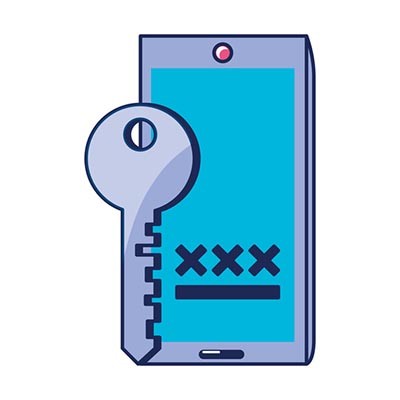Blockchain technology is all the rage these days. Business owners are going to start hearing this buzzword as a bullet point in software solutions. Developers from all over the world are trying to harness the power of encrypted, distributed data, mainly due to the reputation that blockchain has regarding the “unhackable” permanence of the data stored upon it. However, it as powerful as blockchain is purported to be, it isn’t totally infallible.
k_Street Consulting, LLC Blog
Chances are, you’ve heard of “phishing” - a cybercriminal’s scam that steals data, access credentials, and other sensitive information by fooling a user into thinking they are providing this information to someone who is supposed to have access to it. However, there are a few different kinds of phishing, based on how it is carried out. Here, we’ll discuss the realities of spear phishing, and the risks it poses to your business.
If you’re like most people nowadays, your mobile phone is currently well within your reach (and that’s assuming you aren’t reading this blog on it). The fact that most people keep their phone on them at all times has greatly contributed to these devices becoming a part of any given work-related process. One major way is the implementation of two-factor authentication, which we’ll discuss as a part of this week’s tip.
With over 90 percent of people in the United States feeling as though their data is out of their hands, it should come as little surprise that many are looking towards the European Union’s General Data Protection Regulation as inspiration. However, how close is the United States to passing this kind of legislation… and how will smaller businesses fare if (or when) some is passed?
Colleges and universities are part-time homes to more than 16 million people, and employ over 1.5 million more. Most of them utilize the networks set up by the college’s bevy of IT administrators. If you consider that most people have difficulty keeping viruses and other malware off of their personal computers, opening up networks that facilitate this kind of user demand can be tricky. Today, we ask: can a campus’ network every truly be secure?
There’s a big reason why phishing is a primary threat to businesses, and it’s because this method gives hackers a relatively risk-free way of gaining access to a network or other resources. Even being aware of the issue is often not enough to prevent it, as hackers are known to get quite aggressive and crafty with their phishing campaigns. If only a fraction of the 57 billion phishing emails that go out every year are taken seriously, hackers make quite a bit of profit off of users.
Biometrics are a common sight in futuristic or science-fiction settings, but they are increasingly entering the real world in practical ways. In fact, similar technologies are being implemented every day for businesses all over the world. Let’s take a look at some of them, as well as what benefits they provide these organizations.
Microsoft has been at the forefront of security through their numerous operating systems for decades. As the security of computing systems and communication gets more important, and with threats to that security growing exponentially, the world’s leading software company has made it a point to introduce a new security platform to help people in many walks of life keep their endeavors secure. Today we’ll look at the new security & compliance services that are bundled with the Microsoft 365 cloud platform.
Cryptojacking is one of the upcoming threats that your business should have on its radar in the upcoming years. This process involves a malicious entity installed cryptomining malware on a device without the user’s permission. What this provides the hacker with is a steady stream of income at the expense of the victim’s device. What can you do to keep your business’ devices from falling prey to this?
You hear about encryption being used all the time, almost to the point of it being synonymous with security, but what does it really mean to have encryption on your business’ data and devices? We’ll walk you through how encryption can help you in your day-to-day struggle to secure the integrity of your organization’s communication and infrastructure.
Bar none, cybersecurity has to be a major consideration for every business owner or manager in business today. The prevalence of people looking to rip your company off has never been higher; and that is the truth for nearly every company that uses the Internet for anything. Today, we take a look at some of the most serious cybersecurity threats that everyone should be cognizant of right now.
Smartwatches might be great tools for keeping yourself connected to important information, but they bring with them a considerable amount of security threats. Vulnerabilities can make using smartwatches and other wearable technology dangerous. We’ll examine some of the major features of the modern smartwatch, how hackers can use them to cause trouble, and what you can do about it.
Data security isn’t the easiest thing in the world to plan for, especially if your organization doesn’t have any dedicated security professionals on-hand. While protecting your data with traditional methods, like passwords, firewalls, and antivirus, is important, what measures are you taking to make sure a thief or hacker isn’t just walking into your office and making off with your technology?
Computer users today more than likely have a Google account, either for business or personal use. Not only is it accessible and convenient, it offers a versatile assortment of features. Regardless, no amount of accessibility, convenience, or versatility are worth your security. However, many users put precisely that, their security, at risk… often without even realizing it, or why this is such a big deal.
We all download apps. There are literally millions of apps to choose from and sometimes nefarious developers can get their application published with ulterior motives. A situation has just happened as Google has removed twenty-two apps that were found to contain automated click-fraud scripts from the Google Play Store. We’ll take a short look at what these developers were up to, and how the fraudster would affect you if you were one of the two million users that happened to download these apps.
Mobile devices have made conducting business much more convenient, as the right application can allow transactions to be made from anywhere you may be reading this blog. However, this increased accessibility has come with a price - threats to mobile security - which requires any business to be aware of the state of cybersecurity, especially concerning mobile devices, now and in the foreseeable future.
While many of us rely on phones to remain productive during the day, too often are we now picking up the phone to a spammer’s snake-oil sale: “Hello, we are reaching out to inform you that there has been an issue with your account” or similar nonsense. While this is enough of an irritant in our daily lives, it isn’t as though a business can wait for a call to go to voicemail to find out if it was legitimate or not.
Election Day for the United States is November 6th, and regardless of your feelings regarding U.S. politics, the fact of the matter is that millions of Americans will soon go to the polls and cast their ballots. Unfortunately, what many of them don’t realize is how insecure their voting machines actually are, and how they are potentially putting their vote at risk.
Network security is a crucial consideration for every contemporary business owner, as there are just too many threats that originate from an Internet connection to be overlooked. One only has to look at what businesses of all sizes have dealt with, even within this calendar year, to gain an appreciation for how crucial it is that every business owner consider their cybersecurity.
There are literally billions of sports fans in the world, and the popularity of these events brings in big money; and big money typically attracts hackers. Using all types of methods, there has been a history of hacking in almost every sport. Today, we take a look at some of the most famous hacks that have shaken up the sports world.
Thanks to the advent of artificial intelligence, cybersecurity professionals have to reconsider how they approach these threats. Machine learning is one option, as it can help today’s modern solutions learn how to be more effective against advanced threats. On the other hand, what’s stopping the other side from also taking advantage of artificial intelligence? The answer: nothing, nothing at all.
When your employees think about hackers and network security, do they picture some cloaked or hooded figure in a dark room typing away at a keyboard? Do they see a recluse living in their mother’s basement? Popular culture has given many users a false sense of reality regarding hacking attacks and the culture surrounding them, and it can come at the detriment of your business.
It’s not out of the ordinary for employees to not know the best practices surrounding email management, but it’s something that any self-respecting employer needs to consider. How are your employees using their email, and are they putting your organization at risk? The best way to address these issues is taking a two-pronged approach involving training employees on proper best practices, as well as taking technical measures to keep the risk of a breach to a minimum.
Windows is perhaps the most common workplace computing tool, and hackers have been trying for decades to uncover holes in its security. In some cases, like with unsupported operating systems, they’ve succeeded. However, Microsoft’s latest addition to their OS family, Windows 10, seems to have exceptionally potent built-in security measures, many of which have the hackers at the Black Hat conference scratching their heads and scrambling to find threats to talk about.
It’s clear that security professionals have waged war with hackers since the Internet’s inception, but NATO has reaffirmed that cybersecurity is not just a localized problem; it’s a nation-state-wide issue, and one that needs to be addressed. Just like land, air, and sea, cyberspace is now an operational domain, a place that can be considered a battlefield.
Businesses need to take security into account and make it a priority. In fact, security is so important that Verizon has compiled a report of the various types of attacks and data breaches that occurred in the past year. This is Verizon’s Data Breach Investigations Report, or DBIR, and it offers insights into how you can protect your business and secure your assets.
There’s a new augmented reality game on the market these days. Perhaps you’ve heard of it - a title called Pokemon Go, which lets you capture virtual monsters that “appear” on your smartphone’s camera. However, hackers have seized this opportunity to infect players’ mobile devices with a backdoor called DroidJack, which uses the mobile app’s immense popularity to its advantage.
“What’re you in for?” a prison inmate asks. “I shared my Netflix password with my sister,” you say. This conversation might be absurd, but according to a recent ruling in accordance with the Computer Fraud and Abuse Act, it’s one that could actually happen. Now, sharing your Netflix password to let someone catch up on their favorite TV show can be considered a federal offense.
A vulnerability has been discovered that affects all versions of Microsoft’s Windows operating system, including the long-unsupported Windows XP, going all the way back to Windows 95. The vulnerability, called BadTunnel, allows attackers to directly bypass system defenses and initiate a man-in-the-middle attack. The vulnerability isn’t limited to just Windows, either; it also affects Internet Explorer, Edge, and other Microsoft software.
When it comes to cybersecurity, maintenance is key. Whether you choose human-based security or an automated security solution, running into shortcomings is still possible. Human security tends to rely on the word of experts, and anything that doesn’t fit into the guidelines is missed and may therefore get through and wreak havoc. Network security can be a touch overzealous, in a way “crying wolf,” with an excess of false positives that ultimately require human analysis, leading to human frustration.
We often talk about how important it is that your business use the most recent and up-to-date versions of your software solutions, but it’s not often that we get to say that people using Internet Explorer 11 have the right idea. As it turns out, nearly a quarter of all Windows PCs are still using unsupported versions of Internet Explorer, with half of them being found on computers still running Windows XP. What has this world come to?
 Hackers have proven to be a crafty and suspicious lot, and can take advantage of even the most benign technology to infiltrate networks. However, we don’t often associate them with objects in the physical world. Now, even something as simple as a decade-old communications device can be used to open the right garage doors.
Hackers have proven to be a crafty and suspicious lot, and can take advantage of even the most benign technology to infiltrate networks. However, we don’t often associate them with objects in the physical world. Now, even something as simple as a decade-old communications device can be used to open the right garage doors.
 With approximately 5.5 million new devices being connected to the Internet everyday, the Internet of Things presents the biggest security challenge to date for IT professionals. Essentially, an IoT device that’s not secured can easily fall prey to hackers, and with so many different devices being connected, it’s easy to overlook a device or two, like your security cameras.
With approximately 5.5 million new devices being connected to the Internet everyday, the Internet of Things presents the biggest security challenge to date for IT professionals. Essentially, an IoT device that’s not secured can easily fall prey to hackers, and with so many different devices being connected, it’s easy to overlook a device or two, like your security cameras.
 The Internet of Things is practically omnipresent in today’s environment, and many commercial products not only connect to the Internet, but they also come with an app. Due to this type of integration growing more popular, the world is starting to see Internet-connected products that really don’t have much to gain from their connectivity.
The Internet of Things is practically omnipresent in today’s environment, and many commercial products not only connect to the Internet, but they also come with an app. Due to this type of integration growing more popular, the world is starting to see Internet-connected products that really don’t have much to gain from their connectivity.
 The fact that so many businesses are rushing to take advantage of two-factor authentication displays how the password has lost its edge as a security credential. Passwords simply aren’t good enough anymore, and hackers are always finding ways to crack even the most complex passwords. This is why many businesses are looking to improve security through alternative means.
The fact that so many businesses are rushing to take advantage of two-factor authentication displays how the password has lost its edge as a security credential. Passwords simply aren’t good enough anymore, and hackers are always finding ways to crack even the most complex passwords. This is why many businesses are looking to improve security through alternative means.
 The average small and medium-sized business has trouble with the implementation of comprehensive IT solutions, mainly due to these organizations having fewer resources to allocate towards these solutions. This often leads to end-users implementing their own solutions, which can be dangerous under the wrong circumstances. By allowing this “shadow IT” to run rampant in your office, you’re putting business continuity, data storage compliance, and security on the line.
The average small and medium-sized business has trouble with the implementation of comprehensive IT solutions, mainly due to these organizations having fewer resources to allocate towards these solutions. This often leads to end-users implementing their own solutions, which can be dangerous under the wrong circumstances. By allowing this “shadow IT” to run rampant in your office, you’re putting business continuity, data storage compliance, and security on the line.
 Direct denial of service attacks are a major problem for businesses. On one hand, they’re difficult to prevent entirely, incredibly annoying, and costly. Hackers are realizing just how annoying DDoS attacks can be, and are capitalizing on them in order to both make a quick buck, and to take jabs at organizations that aren’t necessarily doing anything wrong.
Direct denial of service attacks are a major problem for businesses. On one hand, they’re difficult to prevent entirely, incredibly annoying, and costly. Hackers are realizing just how annoying DDoS attacks can be, and are capitalizing on them in order to both make a quick buck, and to take jabs at organizations that aren’t necessarily doing anything wrong.
 Cloud computing started out as a trend, but it’s become a staple in the modern business environment. A recent poll of IT and business executives by Harvard Business Review and Verizon shows that 84 percent of respondents have increased their use of cloud services in the past year, 39 percent of which “increased significantly.” The issue that comes from such an increase is the idea of employees accessing information that they aren’t supposed to.
Cloud computing started out as a trend, but it’s become a staple in the modern business environment. A recent poll of IT and business executives by Harvard Business Review and Verizon shows that 84 percent of respondents have increased their use of cloud services in the past year, 39 percent of which “increased significantly.” The issue that comes from such an increase is the idea of employees accessing information that they aren’t supposed to.
 Password security is quite the conundrum. We want our passwords to be easy to remember, but the problem is that passwords that are easy to remember are often simple and insecure. Therefore, it becomes a best practice to use complicated passwords with both upper and lower-case letters, numbers, and symbols to compensate. The “passpoem” might resolve this issue in the most obvious way.
Password security is quite the conundrum. We want our passwords to be easy to remember, but the problem is that passwords that are easy to remember are often simple and insecure. Therefore, it becomes a best practice to use complicated passwords with both upper and lower-case letters, numbers, and symbols to compensate. The “passpoem” might resolve this issue in the most obvious way.
 Requesting a ransom from victims is an unfortunate trend gaining momentum in the hacking world. This is typically done using ransomware (where hackers encrypt data and request money for the key) and distributed denial of service attacks (where hackers threaten to overwhelm a system with traffic, thus knocking it offline). In both scenarios, hackers are looking for the victim to pay up, or else. Should they?
Requesting a ransom from victims is an unfortunate trend gaining momentum in the hacking world. This is typically done using ransomware (where hackers encrypt data and request money for the key) and distributed denial of service attacks (where hackers threaten to overwhelm a system with traffic, thus knocking it offline). In both scenarios, hackers are looking for the victim to pay up, or else. Should they?
 These days, mobile exploits aren’t anything to be surprised about. Most people consider their smartphones to be more secure than their desktops or laptops, but the fact remains that there are just as many exploits, if not more, for mobile devices as there are for PCs. One of the latest mobile threats that can infiltrate your iPhone or Android device takes advantage of Siri and Google Now.
These days, mobile exploits aren’t anything to be surprised about. Most people consider their smartphones to be more secure than their desktops or laptops, but the fact remains that there are just as many exploits, if not more, for mobile devices as there are for PCs. One of the latest mobile threats that can infiltrate your iPhone or Android device takes advantage of Siri and Google Now.
 With new threats emerging all of the time, it’s no wonder that cybersecurity is such a major part of any technological endeavor. Your should be using the most powerful security solutions on the market in order to avoid intensive hacks. Despite the emphasis that our society places on security, it takes a high-notoriety hack to truly shake the public into action; for example, what if the Central Intelligence Agency were hacked by a teenager?
With new threats emerging all of the time, it’s no wonder that cybersecurity is such a major part of any technological endeavor. Your should be using the most powerful security solutions on the market in order to avoid intensive hacks. Despite the emphasis that our society places on security, it takes a high-notoriety hack to truly shake the public into action; for example, what if the Central Intelligence Agency were hacked by a teenager?
 Attention people of the Internet, October is Cyber Security Month! Make sure that you share this information with everyone on the Internet that you know. In a situation like this, sharing content with everyone to raise awareness of a worthy cause is perfectly fine. Although, what’s not alright is the sharing of your personal information online.
Attention people of the Internet, October is Cyber Security Month! Make sure that you share this information with everyone on the Internet that you know. In a situation like this, sharing content with everyone to raise awareness of a worthy cause is perfectly fine. Although, what’s not alright is the sharing of your personal information online.
 With social media playing such an important role in everyone’s day-to-day lives, one has to wonder to what degree this affects the security of online accounts and profiles. Social media might have revolutionized the way we communicate with others, but it’s also revolutionized the way that hackers stalk their victims. How vulnerable are you and the people you love when it comes to your Facebook settings?
With social media playing such an important role in everyone’s day-to-day lives, one has to wonder to what degree this affects the security of online accounts and profiles. Social media might have revolutionized the way we communicate with others, but it’s also revolutionized the way that hackers stalk their victims. How vulnerable are you and the people you love when it comes to your Facebook settings?
 Can you believe it’s already been two years since Cryptolocker, a particularly nasty strain of ransomware, was released into the online environment? By encrypting files on a victim’s computer, and forcing them to pay a fee for their safe return, Cryptolocker has been a significant threat to both business and personal environments. Now, however, a particular strain of Cryptolocker is making gamers look like cybersecurity rookies.
Can you believe it’s already been two years since Cryptolocker, a particularly nasty strain of ransomware, was released into the online environment? By encrypting files on a victim’s computer, and forcing them to pay a fee for their safe return, Cryptolocker has been a significant threat to both business and personal environments. Now, however, a particular strain of Cryptolocker is making gamers look like cybersecurity rookies.
 Spam emails often contain viruses leading to any number of potentially threatening situations for your company’s network. Therefore, it’s essential that your network has a security solution in place that acts as a sort of virtual sheriff, blocking malicious messages from accessing your network, while granting passage to the good guys.
Spam emails often contain viruses leading to any number of potentially threatening situations for your company’s network. Therefore, it’s essential that your network has a security solution in place that acts as a sort of virtual sheriff, blocking malicious messages from accessing your network, while granting passage to the good guys.
 Any user of technology knows that it’s important to optimize security on all fronts of your business. The only problem with this is that passwords aren’t as secure as they used to be. Many businesses have moved in the direction of two-factor authentication, which requires a secondary credential in order to access an account. Did you know there’s a security method that uses your mouse’s behavior to authorize your login?
Any user of technology knows that it’s important to optimize security on all fronts of your business. The only problem with this is that passwords aren’t as secure as they used to be. Many businesses have moved in the direction of two-factor authentication, which requires a secondary credential in order to access an account. Did you know there’s a security method that uses your mouse’s behavior to authorize your login?
 As a business professional, you have a responsibility to ensure that your company’s network and data is protected from hacking attacks. It can be difficult to remember to take all of the necessary precautions, but with our help, you can easily outline all of the measures that should be taken to maximize security for corporate data.
As a business professional, you have a responsibility to ensure that your company’s network and data is protected from hacking attacks. It can be difficult to remember to take all of the necessary precautions, but with our help, you can easily outline all of the measures that should be taken to maximize security for corporate data.
 You might recall how the Silk Road, an illegal online drug market, was recently shut down. Similar to the Silk Road, there’s another distributor of sensitive information out there; this one dealing with zero-day vulnerabilities. These types of cyber threats sell for top-dollar, and hackers are willing to pay in order to access your network.
You might recall how the Silk Road, an illegal online drug market, was recently shut down. Similar to the Silk Road, there’s another distributor of sensitive information out there; this one dealing with zero-day vulnerabilities. These types of cyber threats sell for top-dollar, and hackers are willing to pay in order to access your network.
 The nature of hacking is to take advantage of weak points and exploit them for some kind of profit. This is usually seen in flaws or vulnerabilities found within the code of a program or operating system, but these flaws can be psychological, too. Hackers are increasingly taking advantage of a concept known as “social engineering” to fool users into handing over sensitive information that can be used against them.
The nature of hacking is to take advantage of weak points and exploit them for some kind of profit. This is usually seen in flaws or vulnerabilities found within the code of a program or operating system, but these flaws can be psychological, too. Hackers are increasingly taking advantage of a concept known as “social engineering” to fool users into handing over sensitive information that can be used against them.
 You might be aware that some websites collect personal data from you depending on your mobile device’s location, your browsing history, and several other factors. This information is generally used for marketing, but it could have unforeseen effects on the way you browse the Internet. It can be fairly revealing about your personality, or possibly even incriminating. Therefore, you should be aware of how this personal information is gathered from you without you even knowing it.
You might be aware that some websites collect personal data from you depending on your mobile device’s location, your browsing history, and several other factors. This information is generally used for marketing, but it could have unforeseen effects on the way you browse the Internet. It can be fairly revealing about your personality, or possibly even incriminating. Therefore, you should be aware of how this personal information is gathered from you without you even knowing it.
 Hackers make life difficult for even the most innocent Internet user, and it’s all thanks to a nasty little trick called reverse-engineering. This is when a hacker picks apart the code that makes up a program, then scans it for vulnerabilities or exploitations. A new type of security measure is being developed to protect against the reverse-engineering of software.
Hackers make life difficult for even the most innocent Internet user, and it’s all thanks to a nasty little trick called reverse-engineering. This is when a hacker picks apart the code that makes up a program, then scans it for vulnerabilities or exploitations. A new type of security measure is being developed to protect against the reverse-engineering of software.
 There are a lot of different threats out there: Viruses, malware, spyware, adware, the list goes on. While all of these threats are certainly problematic, some are more dangerous than others. In particular, advanced malware can be exceptionally devastating if they manage to inflict damage on your technology.
There are a lot of different threats out there: Viruses, malware, spyware, adware, the list goes on. While all of these threats are certainly problematic, some are more dangerous than others. In particular, advanced malware can be exceptionally devastating if they manage to inflict damage on your technology.
 One of the most publicized hacks we have seen is last December’s breach of Sony Pictures Entertainment by the Guardians of Peace. In addition to the hackers exposing Sony’s budget, plans for layoffs, and 3,800 SSNs, they leaked personal emails from company executives. This incident should make every business owner a little nervous.
One of the most publicized hacks we have seen is last December’s breach of Sony Pictures Entertainment by the Guardians of Peace. In addition to the hackers exposing Sony’s budget, plans for layoffs, and 3,800 SSNs, they leaked personal emails from company executives. This incident should make every business owner a little nervous.
 Is the password an outdated type of security measure? This question seems to be getting asked around quite a bit, especially with more powerful threats loose all over the Internet. Unfortunately, the fault in passwords generally lies in the fact that humans generally don’t pick passwords that are secure enough. Thanks to a new method called “spaced repetition,” it seems there might be some hope left for the password after all.
Is the password an outdated type of security measure? This question seems to be getting asked around quite a bit, especially with more powerful threats loose all over the Internet. Unfortunately, the fault in passwords generally lies in the fact that humans generally don’t pick passwords that are secure enough. Thanks to a new method called “spaced repetition,” it seems there might be some hope left for the password after all.
 Malware often takes the form of certain unrecognizable web entities, which can make detecting threats tricky at times. New features in popular web browsers, most notably Google Chrome, are making progress toward identifying these threats before they cause your business harm. Chrome’s “Safe Browsing” feature is a good tool to augment your current network security practices.
Malware often takes the form of certain unrecognizable web entities, which can make detecting threats tricky at times. New features in popular web browsers, most notably Google Chrome, are making progress toward identifying these threats before they cause your business harm. Chrome’s “Safe Browsing” feature is a good tool to augment your current network security practices.
 Technology plays a crucial role in the healthcare industry, and thanks to the Health Information Technology for Economic and Clinical Health Act (HITECH), healthcare providers and insurance companies in the United States have to abide by a specific set of regulations when it comes to handling patient data.
Technology plays a crucial role in the healthcare industry, and thanks to the Health Information Technology for Economic and Clinical Health Act (HITECH), healthcare providers and insurance companies in the United States have to abide by a specific set of regulations when it comes to handling patient data.
 After a long 19 years, a critical vulnerability found in the Windows series of operating systems has been patched. IBM informed Microsoft of the flaw back in May 2014. The flaw, which allows for remote code execution via a packet to a Windows server, is found in every Windows operating system since Windows 95.
After a long 19 years, a critical vulnerability found in the Windows series of operating systems has been patched. IBM informed Microsoft of the flaw back in May 2014. The flaw, which allows for remote code execution via a packet to a Windows server, is found in every Windows operating system since Windows 95.
 Passwords are slowly becoming obsolete in the face of more powerful security solutions. This is especially true considering how a hacker can input millions of characters every second in an attempt to break into your account and unleash who knows what into your business’s network. While using a password is still a good idea, professionals are working tirelessly to bring the new face of two-factor authentication to light.
Passwords are slowly becoming obsolete in the face of more powerful security solutions. This is especially true considering how a hacker can input millions of characters every second in an attempt to break into your account and unleash who knows what into your business’s network. While using a password is still a good idea, professionals are working tirelessly to bring the new face of two-factor authentication to light.
 Naturally, if you saw your lamp levitate, you would believe it to be the work of a ghoul and you would cry out in terror. What then would you believe if you saw your PC’s cursor begin to move on its own? In a spooky scenario like this, your computer isn’t haunted. It’s hacked. In the real world, the latter is the scarier of the two.
Naturally, if you saw your lamp levitate, you would believe it to be the work of a ghoul and you would cry out in terror. What then would you believe if you saw your PC’s cursor begin to move on its own? In a spooky scenario like this, your computer isn’t haunted. It’s hacked. In the real world, the latter is the scarier of the two.
 Sometimes it seems like the Internet is plotting against you, and nothing is safe, ever. Even if you don't have any thugs waiting to steal your data, there are hackers - thieves - who will steal it anyway, waiting to take it when you least expect it. One of the most secure ways to protect your company's digital assets is to enact a "zero trust" policy for your network.
Sometimes it seems like the Internet is plotting against you, and nothing is safe, ever. Even if you don't have any thugs waiting to steal your data, there are hackers - thieves - who will steal it anyway, waiting to take it when you least expect it. One of the most secure ways to protect your company's digital assets is to enact a "zero trust" policy for your network.
 A cyber espionage campaign called "Sandworm" has been discovered recently. The hacking attack, said to be based in Russia, has been targeting government leaders and organizations since as early as 2009. The researchers responsible for the discovery, iSight Partners, came to this conclusion after examining the code used in the campaign.
A cyber espionage campaign called "Sandworm" has been discovered recently. The hacking attack, said to be based in Russia, has been targeting government leaders and organizations since as early as 2009. The researchers responsible for the discovery, iSight Partners, came to this conclusion after examining the code used in the campaign.
 In a survey by Cyber-Ark, close to half of employees interviewed admitted that if they were fired tomorrow, they would take with them their former company's proprietary data. This is a shocking revelation considering how much you trust your current staff, maybe even to the point of referring to them as "family." What can you do to protect your business from a former employee with ill intentions?
In a survey by Cyber-Ark, close to half of employees interviewed admitted that if they were fired tomorrow, they would take with them their former company's proprietary data. This is a shocking revelation considering how much you trust your current staff, maybe even to the point of referring to them as "family." What can you do to protect your business from a former employee with ill intentions?
 We've got yet another major data breach to report that affects millions of users, this one of a very personal nature. This week, it was revealed that Chinese hackers compromised 4.5 million medical records from Community Health Systems, a hospital network with 206 facilities in the United States. Ask your doctor today if identity theft prevention is right for you.
We've got yet another major data breach to report that affects millions of users, this one of a very personal nature. This week, it was revealed that Chinese hackers compromised 4.5 million medical records from Community Health Systems, a hospital network with 206 facilities in the United States. Ask your doctor today if identity theft prevention is right for you.
 Yes, you read that title right. If your WiFi isn't protected, you can be hacked by the furry little creature that wanders around your backyard when you're not home. Coco, a Siamese cat from Washington, D.C., was able to discover dozens of weak or unprotected WiFi networks in his neighborhood with his high-tech collar.
Yes, you read that title right. If your WiFi isn't protected, you can be hacked by the furry little creature that wanders around your backyard when you're not home. Coco, a Siamese cat from Washington, D.C., was able to discover dozens of weak or unprotected WiFi networks in his neighborhood with his high-tech collar.
 Your office is likely full-to-bursting with devices utilizing USB technology. It's been a popular way to connect external devices to PCs since the 1.1 version was released in 1998. However, it may be the technology's popularity that will cause its downfall as hackers develop ways to use the device to their advantage.
Your office is likely full-to-bursting with devices utilizing USB technology. It's been a popular way to connect external devices to PCs since the 1.1 version was released in 1998. However, it may be the technology's popularity that will cause its downfall as hackers develop ways to use the device to their advantage.
 All of the recent vulnerabilities and bugs over the past few months, such as Heartbleed, GameOver Zeus, and the zero-day Internet Explorer vulnerability have many people thinking - just how strong is antivirus in the face of such threats? Symantec told The Wall Street Journal their opinion on the subject: Antivirus is "dead."
All of the recent vulnerabilities and bugs over the past few months, such as Heartbleed, GameOver Zeus, and the zero-day Internet Explorer vulnerability have many people thinking - just how strong is antivirus in the face of such threats? Symantec told The Wall Street Journal their opinion on the subject: Antivirus is "dead."
 Smartphone users routinely cycle out their old device for a new one every two years or so. When it's time to upgrade, many users see an opportunity to sell their old phone for extra cash. However, a device that's improperly wiped of its data could lead to identity theft if the data is recovered by the new owner.
Smartphone users routinely cycle out their old device for a new one every two years or so. When it's time to upgrade, many users see an opportunity to sell their old phone for extra cash. However, a device that's improperly wiped of its data could lead to identity theft if the data is recovered by the new owner.
 On Saturday, July 21st 2014, the Hackers on Planet Earth (HOPE) conference took place in New York City. It's a place where hackers discuss ways to improve the society in which we live. One of the more controversial panelists, Edward Snowden, has suggested hackers pool their efforts into creating anti-surveillance technology to decrease government espionage.
On Saturday, July 21st 2014, the Hackers on Planet Earth (HOPE) conference took place in New York City. It's a place where hackers discuss ways to improve the society in which we live. One of the more controversial panelists, Edward Snowden, has suggested hackers pool their efforts into creating anti-surveillance technology to decrease government espionage.
 When it comes to hackers, they are shrouded in darkness and treachery. They lurk in the shadows, waiting for us to make a mistake and to steal our life savings, or other equally nefarious things. But there are a few assumptions that they make concerning their prey, and they wish to hide these from us at all costs.
When it comes to hackers, they are shrouded in darkness and treachery. They lurk in the shadows, waiting for us to make a mistake and to steal our life savings, or other equally nefarious things. But there are a few assumptions that they make concerning their prey, and they wish to hide these from us at all costs.















































